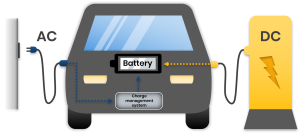1. Types of chargers
AC or DC charging and smart management
Types of chargepoint - AC or DC charging and smart management
When charging an electric vehicle (EV), the type of charger will impact how it charges and how quickly the battery reaches full charge.
EV batteries are charged using either AC (alternating current) or DC (direct current) electricity. Electric motors don’t need AC; in the case of EVs they’re powered by DC electricity from the battery. Electric motors can be powered by direct current (DC) sources, such as batteries or rectifiers, or alternating current (AC) sources, such as a power grid, inverters or electrical generators.
An AC charger is the simplest type of charger. AC chargers rely on the vehicle’s on-board charge management system to convert the AC to DC and ensure the battery is not damaged during charging.
DC charging systems are typically ‘smarter’ than AC chargers. DC charging systems deliver power directly to batteries and do not use the vehicle’s on–board charge management system. To do this safely, the DC charge point must communicate with the vehicle and understand the battery’s size and state of charge (SoC).
The charging process
You need to consider the non-linear nature of the charging process:
Example: if a vehicle returns to a 7.4kW charger and needs 74 kWh of energy to replenish its battery, it will take longer than 10 hours to fully recharge.
The rate of charge decreases as the battery approaches full charge. In an empty battery, there is little internal resistance to the flow which enables the quick transfer of energy. As it reaches 80%-90% SoC, the internal resistance increases, reducing the current in the system. The charging system must increase the voltage to maintain the rate it is delivering energy to the battery.
However, there is a maximum voltage which, if exceeded, can damage the battery. While the voltage cannot rise above this, the current in the system will keep decreasing as the resistance continues to increase. A constant voltage but falling current results in a fall in the system’s power (kW) and, therefore, the battery charge rate. This is why fully charging a vehicle requiring 74 kWh of energy with a 7.4kW charger may take 12 hours.

An illustration of a car with battery charging